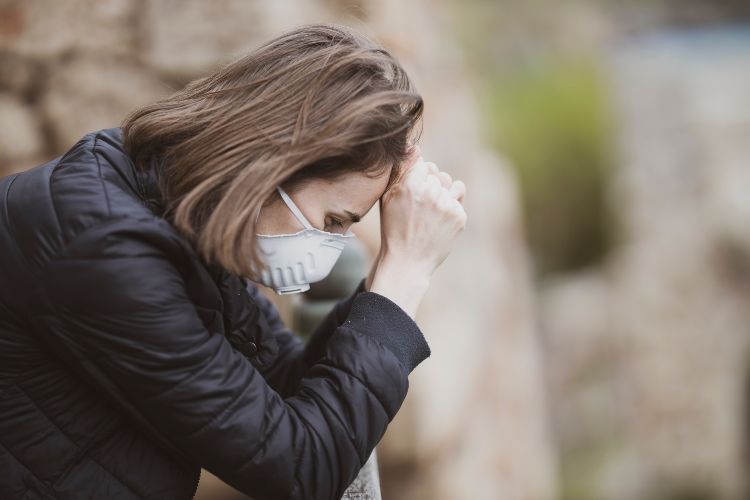A little anxiety is a good thing. It lets you be introspective, considering your actions and their effects on other people.
But too much anxiety is debilitating. Over 40 million Americans struggle with an anxiety disorder.
Many people think that anxiety is a mental condition. That’s true.
But mental conditions can impact the body. Anxiety and the immune system are closely linked to each other. If you want to tackle your anxiety, you need to tackle your overactive immune system as well.
What are the connections between stress and the immune system? How can you improve both? Here is a quick guide to answer those questions.
How Anxiety Impacts the Immune System
Anxiety is a biological process that starts in the brain. When you encounter a threat and feel anxious, your brain releases chemicals so you can respond to the threat.
Adrenaline and cortisol give you energy and improve your mental focus. But too much cortisol is a bad thing.
High levels of cortisol focus your body on the fight-or-flight stress response. Other parts of the body are shut down, which can cause health issues like heart disease, obesity, and further anxiety.
Anxiety disorders stress the immune system because the body never returns to normal functioning. A virus can enter at any time and the body has no protection.
If you develop heart disease, that can also impact the immune system. The heart cannot pump white blood cells to diseased areas.
Diagnosing Your Anxiety
The first step toward improving your anxiety and the immune system is to get help. Go to a psychiatrist and talk to them about your symptoms, both physical and psychological.
There are many anxiety disorders that you could have. All of them require treatment, though there are common treatments you can look to.
Generalized anxiety disorder (GAD) is chronic anxiety and excessive worry. You struggle with situations that should not inspire an anxious reaction. Your anxiety interferes with daily activities for at least six months.
Social anxiety disorder is anxiety focused on social interactions. People with this disorder feel afraid of being humiliated during interactions. They then avoid public speaking and meeting new people.
A panic disorder combines anxiety with troubling physical symptoms. You may have heart palpitations, trouble breathing, and dizziness.
Attacks can occur at any time, and they are reminiscent of heart attacks. Many people have a panic disorder alongside another condition.
A phobia is a fear of something that isn’t threatening. A person will go to great lengths to avoid what they are afraid of. Common phobias include claustrophobia (fear of tight spaces) and acrophobia (fear of heights).
How to Reduce Your Anxiety
Whatever your anxiety condition might be, you have a number of treatment options.
Many people think of psychotherapy when they hear about treatment for anxiety. Talk therapy allows you to identify your anxiety triggers and work on solutions.
You can also go to group therapy. You craft an individual goal, then talk about your progress in a group setting. You can make connections with others and understand new perspectives.
You can take anti-anxiety medications. Talk to your doctor before getting a prescription.
A medication may interfere with other drugs you are taking. It may also interact with foods like grapefruit.
Practices like yoga and meditation encourage mindfulness. You can take your mind off of your anxiety and you can look inward.
Yoga also improves your physical wellbeing. It stretches your muscles and strengthens your heart.
You can even participate in equine therapy. Riding horses builds self-confidence and communication skills.
How to Improve Your Weak Immune System
Resolving your anxiety in itself will improve your compromised immune system. But if you need additional support, you can take a few measures to boost it.
Vitamin C is an immune system booster. It increases the production of white blood cells, which fight off infections. You can take vitamin C supplements every day.
You can also eat foods rich in vitamin C. These include citrus fruits, red peppers, and broccoli. Eat these foods raw so you don’t cook away the nutrients.
Garlic contains sulfuric compounds that can fight infections. Add garlic into soups and sauces.
If you want something to drink, drink green tea. It contains an antioxidant called epigallocatechin gallate, which can enhance immune function. You can drink it hot or iced.
Some protein sources contain vitamins that boost the immune system. Shellfish has zinc, which provides energy for immune cells. Oysters and mussels are particularly rich in zinc.
Avoid touching your face unless your hands are washed. Wash your hands using hot water and soap for at least twenty seconds. Make sure you scrub all surfaces, including the areas beneath your fingernails.
Use disinfectants to clean commonly-touched surfaces like keyboards. Wear a face mask when you go outside or into a confined space.
You may have an immune system disorder in addition to an anxiety disorder. Go to a doctor if you have frequent or long-lasting infections.
Anxiety and the Immune System
Anxiety is not just a mental condition. Anxiety and the immune system are closely linked, and you need to treat both in order to improve your health.
Anxiety floods the body with cortisol, powering our immune systems down. The first step toward treatment is to diagnose your anxiety disorder. Each disorder is different, requiring its own treatment plan.
You can pursue a number of therapies, including group and equine therapy. You can also improve your immune system through diet and hand-washing.
Go to the experts on stress and the immune system. D’Amore Mental Health is Orange County’s leading anxiety treatment center. Contact us today.







































